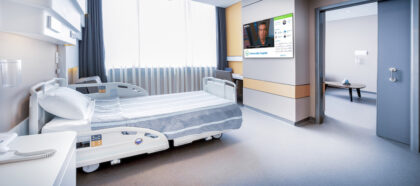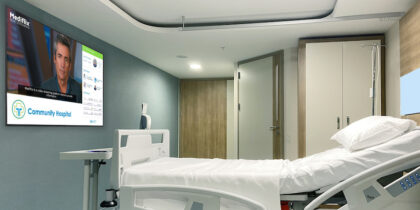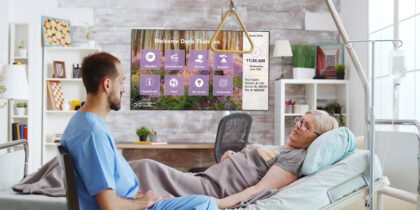Recently, the American Hospital Association (AHA) and AVIA conducted a survey of 300 hospital executives to gauge the state of digital innovation in hospitals. The survey revealed that 75 percent of respondents believe digital innovation is important because of its connection to long-term strategy and competitive differentiation. But respondents also noted that significant barriers to innovation remained.
If you’re part of hospital management, how can you smooth the path to digital innovation? Should you fear smartphones or, instead, embrace them as tools to boost physician productivity and patient satisfaction?
Don’t Fear the Phone — Secure It
Some hospital IT teams and administrators fear smartphones, viewing them as non-compliant devices that present unmitigated security risks. But today’s devices have features that match hospital demands for security. For example, Samsung devices such as the Samsung Galaxy Note9, Samsung Tab S4 and Galaxy J7 are all built on the Samsung Knox security and management platform.
Knox provides a defense-grade security environment for corporate data and apps on Galaxy devices. It enables business privacy and security on smartphones, without the need for third-party IT protection. Knox Configure allows a hospital’s IT team to configure devices, make security patches and send app updates remotely. Hundreds of devices can easily be managed as one. And once deployed, Knox Manage allows your IT team to maintain polices, such as restricting employee access to certain apps and websites. Knox-protected devices can also be wiped remotely, helping to ensure that business and patient information stays safe in the event of a lost or stolen device.
Close the Workforce Tech Gap
Learn how to address the growing tech gap between C-suite and the new generation of digital natives. Download Now
A key concern that arises from ignoring the desire of hospital workers to use smart devices on the job is that they will likely do so anyway. This is especially dangerous within healthcare organizations that use electronic health records (EHR), as medical personnel may access files without proper security in place. Even among the most diligent employees, it’s virtually inevitable that a security protocol will be broken. Providing a secure device is a good way to help employees within your organization stay compliant. By providing devices and ensuring they are covered by security solutions like Samsung Knox, you can stay in front of this issue and keep your organization and its records protected.
Empowering Healthcare Team and Physician Productivity
Mobile technologies — smartphones, smartwatches and tablets — empower healthcare teams and improve physician productivity. When you embrace digital innovation, it can make your entire healthcare organization more efficient.
Imagine that a nurse with a smartphone or tablet can scan a patient wristband to immediately access the patient’s files and information. Rather than toting around a heavy laptop or computer cart or returning to a desktop, the nurse can, in the moment, access needed information at the patient bedside. If the nurse notices something questionable, a secure instant messaging app allows the nurse to reach out to the patient’s physician with information about the result in question. The physician can immediately respond with orders for the nurse to put into effect.
Desktop Connectivity Through a Smartphone
As the scenario above shows, smartphones place a lot of power in the hands of healthcare teams. Yet there are more ways to integrate smartphone connectivity into the typical workflow of healthcare providers. Samsung DeX can allow your hospital’s care teams to work without barriers. DeX extends smartphone capability to a desktop environment, using a keyboard, monitor and mouse. Some work processes, such as entering notes into a patient record, work better and can be easier to read on a desktop. Using DeX, a physician can dock a phone to any monitor with a simple HDMI adapter, choose an app and start working instantly. Both existing Android apps work in with DeX, as do VDI solutions from VMware, Citrix and Amazon.
The flexibility of the provided IT tools is key to hospital staff, who get to choose the best tools that will make their work lives easier.
As the AHA and AVIA survey shows, hospital management wants to embrace digital innovation. Smarter smartphones and better connectivity tools are helping to make that possible.
Learn more about how healthcare technology solutions can enhance efficiencies and improve the patient experience.









